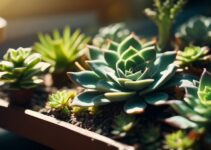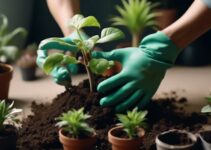When it comes to gardening, you know the importance of providing your plants with the best care possible. You water them, you fertilize them, but have you considered the benefits of adding homemade compost to your gardening routine? Mastering the art of DIY composting can significantly boost your garden's health and productivity. Not only does it enrich the soil with essential nutrients, but it also helps retain moisture, suppress plant diseases, and reduce the need for chemical fertilizers. But where do you start, and how do you ensure that your composting efforts yield the best results?
Key Takeaways
- Composting reduces waste and produces natural fertilizer, benefiting both the environment and the garden.
- Balancing green and brown materials in the compost pile is crucial for a healthy and efficient decomposition process.
- Proper moisture levels and aeration are important factors to consider when managing a compost pile.
- Composting has numerous benefits, including improving soil health, promoting plant growth, reducing food waste, and supporting sustainable gardening practices.
Understanding Composting Basics
If you want to create nutrient-rich compost for your garden, understanding the basics of composting is essential. The first step in comprehending the composting process is recognizing the materials that can be used. Composting benefits the environment by reducing waste and producing a natural fertilizer for your garden. However, it's important to be aware of potential drawbacks such as the odors that can arise if the compost pile is not managed properly. Understanding the composting process involves knowing the ideal balance of green and brown materials, as well as the importance of aeration and moisture. Green materials, like fruit and vegetable scraps, provide nitrogen, while brown materials, such as leaves and straw, offer carbon. Balancing these materials ensures a healthy compost pile. The decomposition process generates heat, which speeds up the breakdown of organic matter. Being mindful of the composting process allows you to harness its benefits while minimizing any potential drawbacks. By understanding these basics, you'll be on your way to creating a thriving compost for your garden.
Selecting the Right Composting Materials
To create high-quality compost for your garden, it is crucial to carefully select the right materials for the composting process. The success of your compost largely depends on the types of materials you choose to include. Here are some key factors to consider when selecting composting materials:
- Balance of Green and Brown Materials: Incorporating a mix of green materials such as vegetable scraps, grass clippings, and coffee grounds, with brown materials like dry leaves, straw, and shredded paper, is essential for a balanced compost pile. Green materials provide nitrogen, while brown materials provide carbon, creating an optimal environment for the decomposition process.
- Avoiding Certain Materials: It's important to avoid including diseased plants, meat, dairy, and oily foods in your compost pile as these can attract pests and slow down the decomposition process.
- Adding Microorganisms: Introducing microorganism-rich materials like finished compost or garden soil can help kick-start the decomposition process and ensure the production of nutrient-rich soil for your garden.
Choosing the right combination of organic waste for your compost pile is crucial for producing nutrient-rich soil that will enhance the health and vitality of your garden.
Building a Compost Bin or Pile
Consider using a sturdy, well-ventilated container or constructing a simple pile in a suitable location for your composting needs. When it comes to DIY compost bins, you have several options. You can repurpose old wooden pallets to create a simple and cost-effective compost bin, or you can purchase a ready-made compost bin from a garden supply store. If you prefer a more customized approach, you can build your own compost bin using materials like wire mesh, wooden boards, or cinder blocks. When it comes to compost pile construction, it's important to ensure proper aeration and drainage. The recommended compost pile size is at least 3 feet high, wide, and deep to generate enough heat for efficient decomposition. The location of your compost pile or bin should be on well-drained soil and in a spot that receives partial sunlight. This encourages the composting process and helps with compost pile maintenance. To avoid composting problems, periodically turn and mix the materials in your compost pile to promote proper decomposition. With the right compost bin design and composting tips and tricks, you'll be able to produce nutrient-rich compost to enhance your gardening endeavors.
Managing Compost Moisture and Aeration
Maintain proper moisture levels and ensure adequate aeration in your compost pile for optimal decomposition and nutrient production. Moisture control is crucial for a successful composting process. Aim for a moisture level similar to a wrung-out sponge, as excessive water can lead to anaerobic conditions and unpleasant odors, while insufficient moisture can slow down decomposition. To achieve this, consider covering your compost pile during rainy periods or adding dry materials like straw or shredded paper to absorb excess moisture. Additionally, regularly turning the pile will help distribute moisture evenly. Aeration techniques play a vital role in promoting the activity of aerobic microorganisms, which are essential for efficient decomposition. To enhance aeration, you can incorporate coarse materials such as twigs or straw into the pile, or use a compost turning tool to regularly aerate the compost. Moreover, consider placing your compost pile in a location with good air circulation to facilitate natural aeration. By carefully managing moisture levels and employing effective aeration techniques, you can ensure that your compost pile remains healthy and productive.
Troubleshooting Common Composting Issues
If you're experiencing issues with your compost, don't worry, it's a common part of the process. One common problem is a foul odor emanating from your compost pile, which can be caused by an imbalance of green and brown materials or inadequate aeration. Another issue you might encounter is a slow decomposition process, often due to a lack of moisture or the presence of too many woody materials.
Common Composting Problems
Common composting problems can often be resolved with a few simple adjustments to your composting process. Here are some common issues and their solutions:
- Odor Control: If your compost pile has a foul odor, it may be too wet or contain too much green material. Add more brown material like dry leaves or shredded paper to balance the moisture and reduce the smell.
- Pest Prevention: If pests like flies or rodents are attracted to your compost, avoid adding meat, dairy, or oily foods. Turn the compost regularly to discourage pests and consider covering it with a breathable material like burlap to deter unwanted visitors.
- Slow Decomposition: If your compost is taking too long to decompose, check the balance of green and brown materials. Adjust the ratio and ensure the pile is adequately aerated to speed up the process.
Solutions for Issues
To troubleshoot common composting issues, carefully assess the moisture content, ingredient balance, and aeration of your compost pile. If you're dealing with pests like flies or rodents, ensure that your compost is properly covered and avoid adding meat, dairy, or oily foods. Consider adding a layer of leaves or straw to deter pests and keep your compost smelling fresh. Odor management is crucial; if your compost smells like ammonia, it may be too wet, so add dry materials like leaves or shredded paper. To control odors, turn the pile more frequently to increase aeration and mix in brown materials. Properly managing these aspects will help you maintain a healthy compost pile and minimize any issues with pests or unpleasant odors.
Harvesting and Using Compost in Your Garden
After months of patiently tending to your compost pile, the time has come to harvest this nutrient-rich humus and infuse it into your garden soil for a bountiful and healthy crop. Harvesting and using compost in your garden is a gratifying step in the composting process. Here are some effective ways to maximize the benefits of your compost:
- Using compost as mulch: Spread a layer of mature compost around the base of your plants to help retain moisture, suppress weeds, and regulate soil temperature. This will also gradually release nutrients into the soil as it breaks down, promoting healthy plant growth.
- Compost tea for plant fertilization: Create a nutrient-rich compost tea by steeping compost in water, then use it to water your plants. This organic liquid fertilizer provides an immediate nutrient boost to your plants and enhances soil microbial activity, promoting robust and healthy growth.
- Incorporating compost into potting mix: Mix compost into your potting soil to improve its structure, moisture retention, and nutrient content. This will provide a fertile environment for your potted plants to thrive.
Frequently Asked Questions
Can I Use Compost From My Kitchen Scraps in an Apartment or Small Space?
You can definitely use compost from kitchen scraps in a small space like an apartment. There are effective methods for apartment composting that cater to urban gardening. It's a great way to reduce waste and enrich your soil.
Is It Safe to Use Compost From a Yard With Pets or Wildlife?
Yes, it's safe to use compost from a yard with pets or wildlife, but be cautious. Pet dander and wildlife feces can contaminate the compost. Ensure proper composting to minimize risks and maintain a healthy garden.
How Can I Prevent Pests Like Rats and Flies in My Compost Pile?
To prevent pests like rats and flies in your compost pile, use natural deterrents like citrus peels and proper bin maintenance. Regularly turn the pile, cover food scraps, and avoid adding meat or dairy products.
What Are Some Creative Ways to Use Compost in Indoor Potted Plants?
To boost your indoor gardening, simply use compost tea applications for your potted plants. Mix compost with water, let it sit, then water your plants with the nutrient-rich solution. It's an effective and creative way to nourish your indoor plants.
Can I Compost Paper and Cardboard With Ink or Colored Printing on It?
Can you compost paper and cardboard with ink or colored printing on it? Yes, you can compost paper and cardboard with ink or colored printing. The ink used in printing is typically soy-based and safe for composting.






